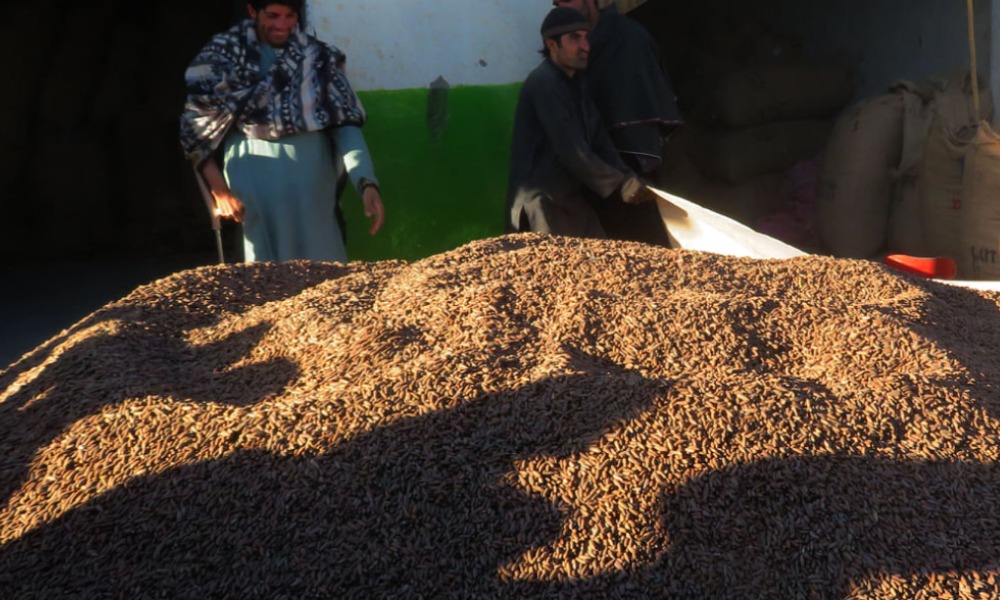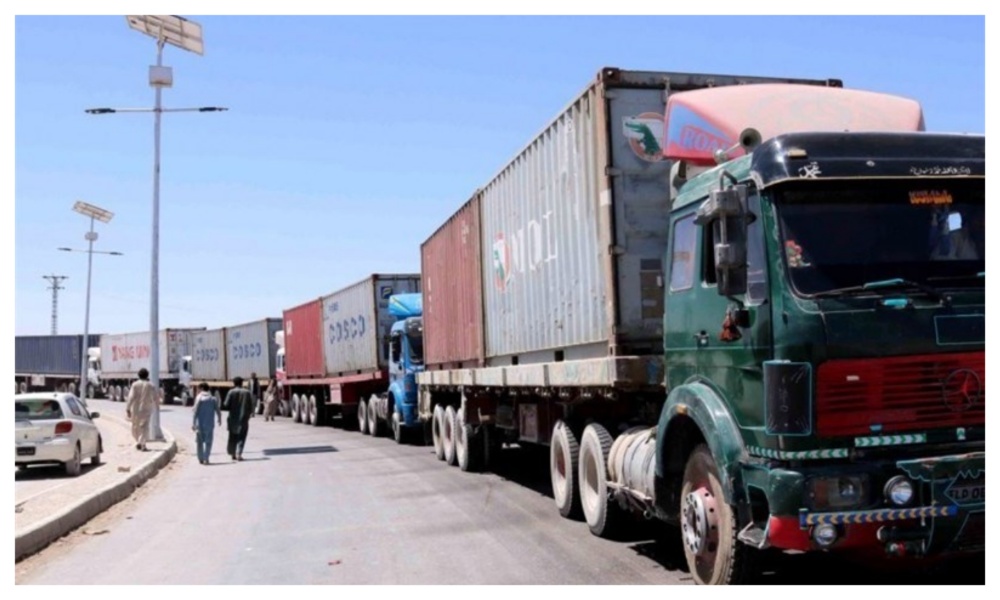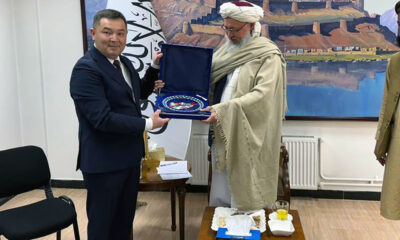Business
Afghan growers seek larger market for profitable pine nuts

The pine nut growers in Afghanistan are hoping to further expand overseas market and earn a fair income in a bumper harvest, trying to shake off the negative impacts brought by COVID-19 and domestic turmoil.
Afghanistan is having a bumper harvest of pine nuts, with its output reaching 17,000 tons this year.
Harvesting and processing pine nuts has been a family business in every harvest season as a very important source of income. From pine cones to the ready-for-sale products, the fat-rich nuts need to go through multiple procedures.
The best pine nuts in the country gathered in the pine nut wholesale market in Kabul. The merchants and workers are busy cleaning, sorting and packaging them.
Pine nut trees grow in eight eastern provinces of Afghanistan, including Khost, Paktia, Paktika, Kapisa, Kunar, Nangarhar, Nuristan and Laghman.
The country’s northeastern mountains, where the average altitude is higher than 1,000 meters with lots of snow and sunlight, provide sound environment for pine trees with pine nuts of outstanding quality.
“Paktia people’s life depends on pine nuts because they don’ have land. The Urgun region in Paktia and the Khost Province are basically mountains, and locals harvest pine nuts from there,” said Abdul Wali, a pine nut trader.
“Pine nut is good for human body. That’s why we like to have it,” said Ahmad Jaweed, a customer.
Despite the good harvest, the pine nuts can hardly reach its essential overseas market due to the impact of COVID-19 and complicated domestic situation.
“The price is better than before. In the past, one kilo of pine nuts was 2,800 afghani to 3,000 afghani (about 30-32 U.S. dollars). But now it’s 1,700 A to 1,800 afghani (18.5-19.6 U.S dollars) because exporting them to other countries became difficult,” Jaweed said.
People in China helped out as a close neighbor earlier this month. During a live-streaming promotion event of the China International Import Expo (CIIE) on Nov 6, the influencers from China Media Group (CMG) and e-commerce companies sold 120,000 cans of pine nuts in minutes.
The Afghanistan Pine Nuts Production Union wrote a thanks letter to CMG. The pine nuts traders said that this business can not only bring in foreign exchanges to Afghanistan, but also provide large amounts of job opportunities.
“If we do pine nut business with China, I can tell you that around 50,000 people will have jobs in this field,” Wali said.
“From the economic point of view, it’s very beneficial for us,” Jaweed said.
Business
Afghanistan-Kazakhstan banking ties discussed in Kabul meeting
Business
Afghanistan, Kazakhstan envoys discuss expanding trade and regional connectivity
Ambassador Shakeeb thanked Kazakhstan for its continued support and constructive engagement with Afghanistan, particularly in efforts aimed at peace and economic development.

Afghanistan’s Ambassador to Pakistan, Sardar Ahmad Shakeeb, has met with Kazakhstan’s Ambassador to Pakistan, Yerzhan Kistafin, to explore ways to strengthen bilateral relations and advance regional cooperation.
The two envoys exchanged views on Afghanistan–Kazakhstan ties, regional connectivity, and major infrastructure initiatives, as well as the opportunities and challenges facing regional trade. Discussions also touched on Kazakhstan’s role in promoting regional stability and other matters of mutual interest.
Ambassador Shakeeb thanked Kazakhstan for its continued support and constructive engagement with Afghanistan, particularly in efforts aimed at peace and economic development.
He expressed hope that the proposed $3 billion joint trade agreement, once finalized, would bring tangible benefits to both countries and contribute to broader regional economic integration.
Ambassador Kistafin reaffirmed Kazakhstan’s support for stability and economic growth in Afghanistan, highlighting his country’s involvement in key regional connectivity and trade projects.
He said the current security and stability situation in Afghanistan has increased Kazakhstan’s confidence in expanding regional trade and transit, and praised the efforts of the Islamic Emirate in this regard.
He also stressed the need for coordinated regional efforts to ensure lasting stability, sustainable economic development, and the smooth movement of goods and transit across the region.
Business
Mahirood Customs leads Iran’s exports to Afghanistan
More than 1.5 million tonnes of goods were exported to Afghanistan through the border crossing during this period.

Mahirood Customs in South Khorasan province has become Iran’s main export gateway to Afghanistan, accounting for 36 percent of the country’s total exports to its eastern neighbor, Iranian officials said.
South Khorasan Governor Seyed Mohammadreza Hashemi told local media that Mahirood ranked first among Iran’s 71 active customs points during the first eight months of the current Iranian year.
More than 1.5 million tonnes of goods were exported to Afghanistan through the border crossing during this period.
Official customs figures show that Iran’s total exports to Afghanistan exceeded 4.26 million tonnes in the first eight months of the year, with Mahirood handling the largest share, Hashemi said.
He attributed the strong performance to South Khorasan’s strategic location, improved border infrastructure, effective planning, close cooperation with traders, and coordinated efforts by government agencies.
Hashemi said the expansion of exports via Mahirood Customs is contributing to economic growth, job creation, and stronger economic diplomacy for the province.
He added that continued support for exporters and streamlined customs procedures could further increase South Khorasan’s share of the Afghan market and other target markets in the future.
-

 Latest News5 days ago
Latest News5 days agoUS delivers second batch of Afghan Black Hawk helicopters to Peru
-

 Latest News3 days ago
Latest News3 days agoGermany speeds up admission of Afghans from Pakistan
-

 Sport3 days ago
Sport3 days agoIPL 2026 Auction set for Abu Dhabi with $28.6 million purse at stake
-

 Business4 days ago
Business4 days agoAfghan economy posts second year of growth despite deep structural challenges
-

 Latest News3 days ago
Latest News3 days agoAfghanistan to establish independent oil and gas authority
-

 Sport4 days ago
Sport4 days agoATN to broadcast ‘The Best FIFA Football Awards 2025’
-

 Latest News4 days ago
Latest News4 days agoUS intelligence chief warns of ‘direct threat’ from suspected terrorists inside the country
-

 International Sports4 days ago
International Sports4 days agoILT20: Jahangir powers Dubai Capitals to nine-run win over Abu Dhabi Knight Riders

























